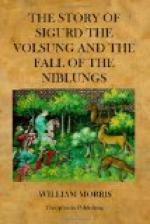So betwixt the earth and the
water his son did Sigmund lay;
But lo, when he fain would
follow, there was neither ship nor man,
Nor aught but his empty bosom
beside that water wan,
That whitened by little and
little as the night’s face looked to the
day.
So he stood a long while gazing
and then turned and gat him away;
And ere the sun of the noon-tide
across the meadows shone
Sigmund the King of the Volsungs
was set in his father’s throne,
And he hearkened and doomed
and portioned, and did all the deeds of
a king.
So the autumn waned and perished,
and the winter brought the spring.
Of the last battle of King Sigmund, and the death of him.
Now is Queen Borghild driven
from the Volsung’s bed and board,
And unwedded sitteth Sigmund
an exceeding mighty lord,
And fareth oft to the war-field,
and addeth fame to fame:
And where’er are the
great ones told of his sons shall the people name;
But short was their day of
harvest and their reaping of renown,
And while men stood by to
marvel they gained their latest crown.
So Sigmund alone abideth of
all the Volsung seed,
And the folk that the Gods
had fashioned lest the earth should lack
a deed
And he said: “The
tree was stalwart, but its boughs are old and worn.
Where now are the children
departed, that amidst my life were born?
I know not the men about me,
and they know not of my ways:
I am nought but a picture
of battle, and a song for the people to
praise.
I must strive with the deeds
of my kingship, and yet when mine hour
is come
It shall meet me as glad as
the goodman when he bringeth the last
load home.”
Now there was a king of the
Islands, whom the tale doth Eylimi call,
And saith he was wise and
valiant, though his kingdom were but small:
He had one only daughter that
Hiordis had to name,
A woman wise and shapely beyond
the praise of fame.
And now saith the son of King
Volsung that his time is short enow
To labour the Volsung garden,
and the hand must be set to the plough:
So he sendeth an earl of the
people to King Eylimi’s high-built hall,
Bearing the gifts and the
tokens, and this word in his mouth withal:
“King Sigmund the son
of Volsung hath sent me here with a word
That plenteous good of thy
daughter among all folk he hath heard,
And he wooeth that wisest
of women that she may sit on his throne,
And lie in the bed of the
Volsungs, and be his wife alone.
And he saith that he thinketh
surely she shall bear the kings of the
earth,
And maybe the best and the
greatest of all who are deemed of worth.
Now hereof would he have an
answer within a half-month’s space,
And these gifts meanwhile
he giveth for the increase of thy grace.”




